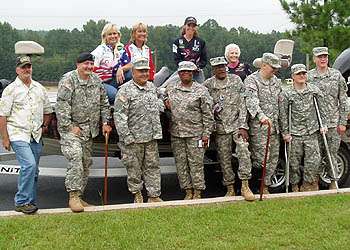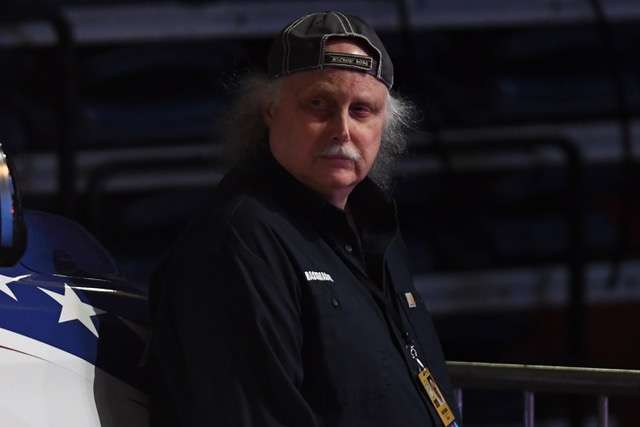
Thank you for the sacrifices made,For the ones who never came back homeThe highest price was paid.— Hank Brake, “Thank You”
It was her eyes.
It was her hand over her heart.
It was the way she swayed and mouthed the words of the song.
A stranger in the crowd, brought to me through a telephoto lens.
But it was the look on her face that brought my camera down.
And then I saw it.
All around me.
That same look.
Eyes straight ahead, hands and hats over hearts. None looked around. A straight-ahead focus you could feel.
All looking behind me, at a lone bass boat.
And on that boat stood a wounded warrior clutching an American flag.
At my feet, the waves became silent as they rolled on the bank, seagulls drifted on the thermals above, as quiet as the lake, the only sound that of the national anthem floating through the crowd.
And as I swung the camera back up and looked through the powerful lens, there stood the wounded warrior, saluting the flag he held.
With a breeze, the flag unfurled, and some of the Iraqi sands it once flew above floated over Clarks Hill Lake during this, the sunrise of National POW/MIA Recognition Day.
I watched as the wounded warrior on the bass boat held the flag high into the wind.
Through two songs, the salute never moved. Legs wide apart, back straight, eyes only on the flag in his left hand.
And as I watched, I became aware of why songs are written to honor the men and women who serve, special songs for special people.
Because out there on that bass boat, a wounded warrior stood holding the American flag, clutched tight in his wounded left arm.
And the flag never dipped.
Reflections on a bass boat
he works doubles to do it, waiting tables.
A 60-mile drive one way to the Golden Corral in Fort Walton Beach, Fla. “If you give the restaurant a plug, I may be able to pick up more hours.”
WBT pro Sammie Jo Denyes already works four to five days a week, from 9:30 a.m. to 11 p.m., but if that Golden Corral has more hours, give them up, “You do what you got to do to fish.”
She’s 36 years old, married, with two kids (Lindsay, 16, and Kyle, 18), and lives in the small town of Florala, Ala., but works in another state because “You don’t have many jobs in small towns,” and she has been bass fishing, ” … forever. My daddy took me for as long as I can remember. He’s the best bass fisherman I know, my daddy is.”
Daddy is Samuel Whitstine, a 60-year-old retired Louisiana logger. And I’m looking at him right now, in a picture on the side of his daughter’s bass boat.
Not sure if he has rock-hard abs today, but he does in this picture, mainly thanks to the fact he’s about 20 years old. The time is likely 1969 or 1970, and the place is Vietnam.
He’s the shirtless guy at the end, part of the “Ready to Roll” 534th Transport, wounded in Vietnam. And although Sam made it back home to Louisiana, the young man standing next to him, Melvin Miller from Iowa, did not.
The boat is wrapped to honor all those who served: all those who served and came back, all those who served and didn’t make it back, but especially for that shirtless veteran.
“He raised me to respect the flag, respect those who fought for it and for freedom, and to always honor them — and never forget the sacrifices they made,” she says.
And she doesn’t.
A couple of days ago, Sammie and some of the other WBT pros stopped by the Wounded Warrior Transition Battalion at Fort Gordon in Augusta, Ga., to “talk bass fishing, but mainly just to say thank you to the men and women — their sacrifice allows us, all of us, to do what it is we do.”
The Lee Teter painting “Vietnam Reflections” drapes the front side of Sammie’s boat, in the back “an eagle, which to me represents America, with a tear in his eye as he looks at the POW/MIA flag.”
“When I was fishing Neely Henry in Gadsden, Ala., a guy came up to the boat and looked at it. Turns out he was a vet, and he just stared at the POW/MIA flag and he started to cry, just started to cry right there in the Dollar Store parking lot.”
Sammie brushes her short blond hair back, shifts on the picnic table we are sitting at under 60-foot-tall pine trees in a campground reserved for veterans and their families, moves a pinecone around under her sneaker, looks back up at me and says, “This isn’t my boat wrap. This is a boat wrap for the heroes, for all the men and women veterans … “
And the sentence is completed only by the sound of the pinecone under her sneaker.
The man holding the flag
Eight honorable discharges.
Veteran of the Vietnam War, the Gulf War and, recently, Camp Trebil, Anbar Province, Iraq.
David Phillips, 48th Brigade, Georgia Army National Guard.
Every time I asked him a question, the answer ended with “sir.” Dark eyes straight ahead, eye to eye, looking right at me, looking through me, looking deep within me.
A gaze that has seen it all, while seeing way too much.
To questions, he gives short answers, long on meaning. “When I first saw that boat pull into the campground here, I just looked at it, just looked at it … “
db: “Why, what did it mean to you?”
Phillips: “What it means to me? It means to me … honor … dignity … pride. That’s what it means to me, sir.”
Sammie, off to my left, tries to sneak wiping a tear from her eye.
Phillips: “To know that people care … that someone out there cares about us, that means the world to me, sir.”
As I turn to Sammie, I catch her wiping the other eye, and the waitress who works doubles just so she can keep fishing turns from me and looks at her boat, “Trouble is, when I pull that out of the water tomorrow, the next day, the next month, and pull that boat cover over that part there with the POW/MIA flag on it … all those men and women will still be missing. They’ll still be missing.”
And the three of us just sat there.
Wishing … wishing that all those of that flag were there with us, to once again smell that sweet Georgia pine.
— db
Don Barone is a member of the New England Outdoor Writers Association. Other stories of his can be found on Amazon.com. For comments or story ideas, you can reach db at www.donbaroneoutdoors.com.

